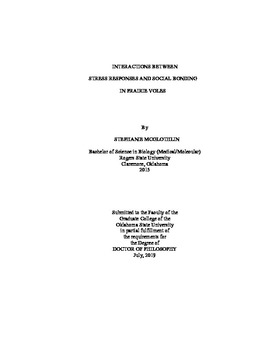| dc.contributor.advisor | Curtis, Tom | |
| dc.contributor.author | McGlothlin, Stephanie | |
| dc.date.accessioned | 2020-01-30T15:03:11Z | |
| dc.date.available | 2020-01-30T15:03:11Z | |
| dc.date.issued | 2019-07 | |
| dc.identifier.uri | https://hdl.handle.net/11244/323364 | |
| dc.description.abstract | Stress is a significant factor affecting health: chronic stress is correlated with a number of diseases and disorders. Individuals in positive social relationships (pair bonds, marriage etc.) are typically healthier than those who are not. This study examines the interactions between stress and social relationships in a monogamous rodent, the prairie vole. The effects of stress on social bonding is sexually dimorphic in prairie voles: exposure to a stressor increases the likelihood of forming a monogamous "pair bond" in males, but decreases the likelihood in females. To determine whether the positive effects of stress on pair bonding in males were due to female preferences, this project examined the effect of acute stress in males on mate choice by females. It was hypothesized that acute stress in males would affect female mate choice. The goals of this project were reciprocal: to examine the effect of stress in males on mate choice by females, and then to examine the effects of pair bond formation on stress hormone levels across time and on stress behaviors. For this second goal, it was hypothesized that pair bond formation would affect stress behaviors and hormone levels across time, and predicted that stress would positively influence these measures. To carry out these goals, a new stress paradigm was designed and females were exposed to a mate choice test, during which they could spend time with a male exposed to a stressor, or a non-stressed, control male. For the second goal, fecal samples were taken at various time points across a 14-day period following pairing to measure fecal corticosterone. Males were also exposed to two behavioral tests for anxiety. The results of this study supported the first hypothesis: acute stress in males does influence mate choice by females. Stress does not positively affect mate choice, however: acute stress in males appears to negatively influence female mate choice. The results of this project partially support the second hypothesis: pair bond formation appears to influence stress hormone levels over time, but not anxiety-like behaviors. | |
| dc.format | application/pdf | |
| dc.language | en_US | |
| dc.rights | Copyright is held by the author who has granted the Oklahoma State University Library the non-exclusive right to share this material in its institutional repository. Contact Digital Library Services at lib-dls@okstate.edu or 405-744-9161 for the permission policy on the use, reproduction or distribution of this material. | |
| dc.title | Interactions Between Stress Responses and Social Bonding in Prairie Voles | |
| dc.contributor.committeeMember | Curtis, Kathleen | |
| dc.contributor.committeeMember | Benjamin, Bruce | |
| dc.contributor.committeeMember | Volberding, Jennifer | |
| osu.filename | McGlothlin_okstate_0664D_16405.pdf | |
| osu.accesstype | Open Access | |
| dc.type.genre | Dissertation | |
| dc.type.material | Text | |
| dc.subject.keywords | corticosterone | |
| dc.subject.keywords | pair bond | |
| dc.subject.keywords | prairie vole | |
| dc.subject.keywords | stress | |
| thesis.degree.discipline | Biomedical Sciences | |
| thesis.degree.grantor | Oklahoma State University | |
